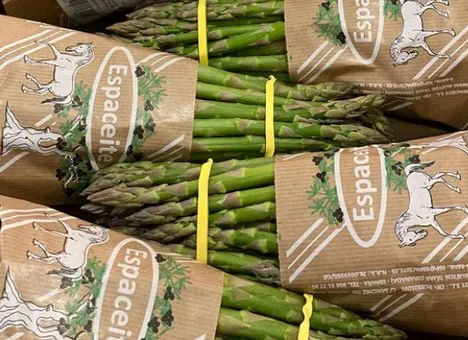The European asparagus season is picking up speed rapidly: There are also brisk imports from the Spanish growing region of Granada, as Nils Riel, product specialist at the fruit trading company of the same name based in Kehl am Rhein, tells us. "Due to the cold snap in southern Europe, the Spanish campaign is getting off to a somewhat slower start this year, but otherwise we can look back on a normal start to the season."
Complementing the first batches from Spain, Mexican air-freighted asparagus continues to be traded. Import duties have had to be paid since March 11, Riel outlines. "Mexican supplies are now running low as is customary for the season, and we expect the last deliveries in about 2-3 weeks. Depending on the customer structure of each buyer, asparagus from overseas or Europe will be traded. In any case, it is more convenient for us to trade from both sources at the same time, because we could switch to the other country in case of a supply shortage in one country of origin. In short, overseas imports are currently necessary to meet European demand, although there is still a shortage of product."

Espaceite brand Spanish green asparagus in bunches of 500 grams. Spanish produce is selling at over 3.00 euros/bunch, with Mexican produce trading at 2.50-2.70 euros/bunch.
Due to its proximity to the US, a significant portion of the Mexican asparagus crop continues to be exported to its neighbor to the north, Riel knows. "Due to logistical challenges, there has also been less volume in Mexico this year, so the exportable portion for the European market has been lower compared to other years." In keeping with the circumstances, he says, transportation and airfare costs were also significantly higher. "We have been seeing this phenomenon for several years. Corona has additionally eliminated a significant part of flight capacity. Accordingly, trade prices in terms of overseas asparagus have also been driven up."
Complementing instead of competing
Simultaneously with the start of the season in Spain, the first Italian, Greek and soon Hungarian asparagus are hitting the German market as well. Riel says, "In recent years, we have observed more of a mutual complementation rather than competition. Each country of origin has its periods when it's goods are sold more frequently. As a rule, these different goods can be traded without any problems. In this respect, except for one or two weeks during the European asparagus season, we don't see any major surpluses, either for green or white asparagus."
Shift from wholesale markets to food retailers
The pandemic is known to have had an impact on consumer buying patterns and therefore on retail structures. "The bottom line is that we were able to sell more asparagus last year's season because individuals cooked more at home. In general, there has been a noticeable shift from the wholesale markets into the food retail sector." Riel looks back on the past year, which was dominated by Corona. According to him, asparagus seems to have developed from a premium product into a product for the masses.
Strikes in southern Spain
Despite the increased logistics costs, Riel said he expects a good asparagus season this year. "What could still play a role are the strikes that are currently taking place not only in Andalusia but also at the airports, for example in Frankfurt. In the case of correctly announced strikes, one can make the appropriate arrangements. But in the case of spontaneous strikes that is not always possible."
For more information:
Nils Riel
Riel Fruchthandel
Hauptstraße 95
D - 77694 Kehl
Tel.: 0049- 7851 / 9110
Fax: 0049- 7851 / 911200
Mail: info@rielfruchthandel.com
www.rielfruchthandel.com
